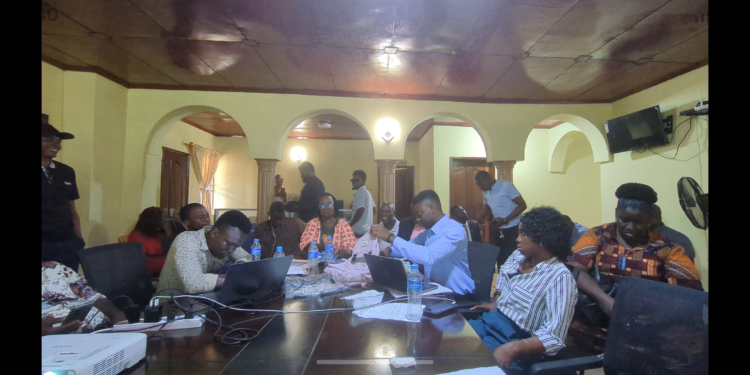By Kemo Cham
The advocacy organization, Health Alert on Monday October 20th hosted finance officers of five of Sierra Leone’s district councils to discuss their health budgets.
The districts – Falaba, Karene, Kenema, Bombali and Western Area Rural – are part of an initiative co-championed by Health Alert and WASHNet Sierra Leone, geared towards promoting domestic financing for healthcare services. It is part of a project supported by the Global Vaccine Alliance (GAVI), through the Global Health Advocacy Incubator (GHAI), which seeks to promote domestic resource mobilization to fund particularly Primary Health and Immunization. This initiative is in response to growing donor apathy towards the development of donor-dependent countries.
Sierra Leone relies almost entirely on donors for its development, especially in the healthcare sector. GAVI, for instance, funds 90 percent of the country’s childhood immunization programme.
Monday’s meeting convened in the headquarters of Health Alert at Backhall Road in Freetown provided a platform for dialogue between representatives of Civil Society and the district councils on ways to enhance domestic resource mobilization to fund their domestic healthcare needs. The participants also included Districts Coordinators of Health Alert and project coordinators of sister civil society organizations involved in the initiative.
“The world all over, we have been informed, funding is dwindling. Funding is narrowing down,” says Victor Lansanah Koroma, Executive Director of Health Alert.
The meeting, he explained, was meant to see allocations earmarked for primary health care and immunization services in each district’s budget following conclusion of bilateral budget discussions at both national and district levels. Health Alert, under the GHIA funded project, facilitated the enhanced participation of the five district councils through trainings on prioritization of immunization and primary healthcare in budgeting. It also supported 10 CSOs and media practitioners to participate in the discussions.
According to Koroma, the district councils committed to prioritise immunization and primary healthcare in their budgets during those engagements.
“So this is a follow up of that meeting to see whether those commitments were actualized,” he said at the start of Monday’s meeting.
“We want to have a view and understanding of what the district council’s budget look like,” Koroma added.
The meeting was one of the last engagements as the project concludes its first year of operationalization. Plans are underway to convene members of the private sector in domestic resource mobilization for healthcare before the end of the year.
Musa Ansumana Soko, Team Lead for WASHNet Sierra Leone, said the project within the last one year has provided understanding of key factors that are holding backing progress, which need to be removed as barriers in moving forward for immunization and primary healthcare.
“All of these golden efforts will then inform the second phase of the project,” he said, adding: “And we are very much hopeful that with your commitment and dedication, Health Alert, WASHNet as well as our partners – GAVI and GHAI – will be able to understand not only the context but specifically how differently we can support civil society in deepening the kind of work that is already being done.”
The presentations revealed concerns in some districts but also gains in others. Falaba, for instance, one of the two new districts struggling with lack of infrastructure, saw an increase in allocation from NLe8,000 to NLe10, 000 to immunization and primary healthcare. Bombali District, on the other hand, didn’t make a presentation, amid concerns of cooperation by its council.
But Abdurahman Keys, a member of the Health Alert Coalition, who chaired Monday’s meeting, said that they’ve witnessed “some positive steps” by the councils, especially in the area of primary healthcare and immunization financing which needs to be celebrated.
“With domestic resources they collected, they ensured that there are lines being created from their budget,” Mr Keys, who is the Director of the West Africa Youth Network for Peace Education and Economic Development (WAYNPEED), told ManoReporters in an interview.
“So we have seen a lot of gains at this initial phase. We believe as we continue sustaining this approach, there would be more improved gains as we go along in supporting primary healthcare and immunization financing,” he said.






















